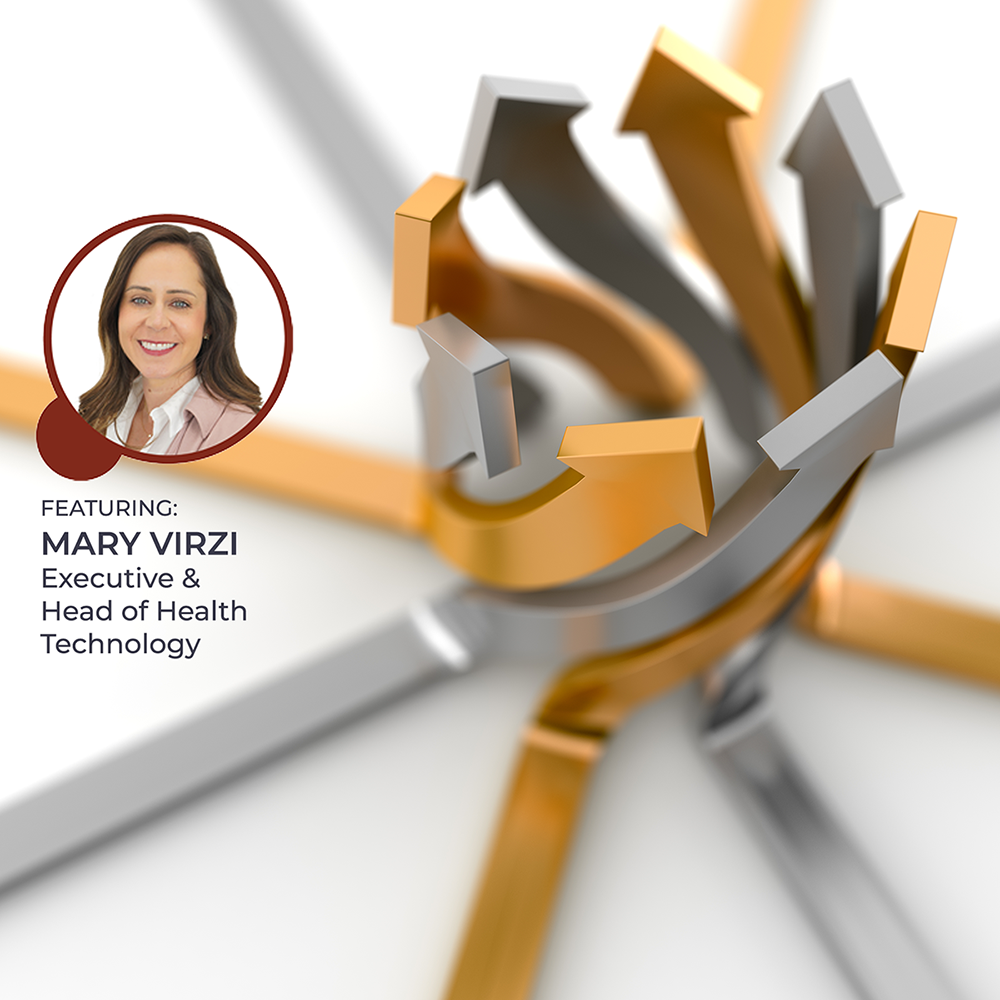Breaking boundaries: The convergence evolution – A health technology perspective
 Mary Virzi / 10 October 2023
Mary Virzi / 10 October 2023With contributions from: Andrew Sgarlato
The health industry is undergoing a period of accelerated transformation and modernization as a result of advances in technology, access to data, and collaboration in the wake of the COVID-19 pandemic. What has emerged is a convergence – an industry evolution grounded in the integration of various stakeholders, technologies, and processes to expand capabilities and create a seamlessly connected ecosystem. Traditionally separate entities such as payers, life sciences, providers, pharmacies, and technology companies are coming together to think differently about the way their organizations operate. It is anticipated that this large-scale, systemic change has the potential to disrupt and solve some of the health industry’s most pressing challenges.
Convergence is rooted in the idea that building holistic capabilities to address broader aspects of the healthcare value chain will enable efficient and rapid improvements, thus modernizing the health industry and enhancing both patient experience and healthcare outcomes.
Health Technology companies are at the forefront of this transformation; they are poised with unique capabilities to develop platforms and technologies that fuel the cohesive collaborations emerging because of convergence.
A key element of convergence lies in stakeholder integration – inclusive of healthcare providers, researchers, technology experts, and entrepreneurs – within an environment where they can interact, exchange dialogue, and share resources. Health tech companies can play a crucial role in enabling this idea exchange by building forums and platforms that open new channels of communication, facilitating a more seamless conversation between entities previously disconnected from one another. This level of cross-sector collaboration can support innovations and solutions to address the most complex, urgent, and long-standing healthcare challenges of our time. For example, a convergence of Life Sciences and Health Tech companies involves utilizing artificial intelligence to identify trends in specific patient populations to help predict the effectiveness of new drug or device candidates. Another use case is that of hospitals and ambulatory centers that are investing in cloud computing and remote monitoring devices to improve the surgical experience. Health tech companies are experts in these spaces, and have the capabilities necessary to pioneer innovative, interdisciplinary approaches, particularly when done in partnership with cross-sector industry stakeholders.
As convergence fuels and accelerates solution development across the health industry, user-centricity is becoming an increasingly critical principle of design, and another area where the health tech industry can help lead the way. Medical technology companies in particular have been operating with a user-centric approach to design for years, involving end users throughout the process to rapidly test, learn, and improve, particularly when it comes to identifying user pain points and preferences. This crucial design approach positions med tech companies to take center stage in this emerging landscape, as they can develop solutions that more fully meet the evolving needs of the health industry’s patients and stakeholders.
As priorities and strategies shift in a post-pandemic world, health tech companies have unique capabilities that will fuel emerging trends.
Technology, data & artificial intelligence
Artificial intelligence, IoT, big data, and robotics are rapidly increasing in capability and criticality across the health industry. The increasing prevalence of these technologies is expanding possibilities to develop advanced med tech solutions that leverage their individual capabilities. An example is the development of remote monitoring devices – utilizing the capabilities of both AI and IoT, these devices collect and share data in real-time, providing comprehensive health insights for providers. Within the health tech market, med tech companies specifically are leaning into this trend by developing more advanced wearable devices, mobile applications, and remote monitoring platforms that successfully harness the power of these new technologies. The integration of remote monitoring and telemedicine facilitates real-time data collection and remote consultations, resulting in timely interventions for patients. These collaborations pose significant opportunities for both health and med tech companies to provide solutions that span sectors, ultimately enhancing healthcare access and improving patient outcomes.
Personalized medicine and precision diagnostics
Convergence has strengthened the utilization of genomics, digital health, and advanced diagnostics. Technologies such as genetic sequencing, bioinformatics, and AI-insights allow med tech companies to tailor their tools to the individual needs of patients, contributing heavily to the emerging trends of precision medicine. Health tech companies have the ability to utilize big data and AI algorithms to gather insights, allowing them to develop more advanced diagnostic tools that enable early detection and accurate diagnoses. Using these vast amounts of data, AI-powered imaging systems can analyze medical images with extremely high precision – aiding in the early detection of cancer and other diseases. Med tech companies are well positioned to lead the revolution in data-driven insights and precision diagnostics.
Market expansion
Convergence has driven high demand for innovative health and medical technologies. Consumers are increasingly embracing technology-enabled solutions, expanding the market for tech companies to develop novel therapeutic and diagnostic services, playing a complementary role in the work of providers. The Centers for Medicare and Medicaid Services predict that spending for medical devices will reach between $300 and $400 billion by 2030.1 All health tech companies looking to adapt to the growing needs of the industry will be able to tap into new opportunities to leverage predicted trends in healthcare spending.
Current market growth for health tech companies is largely driven by gradual product improvement – not innovation and new product development. However, the area is ripe for disruption. With an inclusive strategy, innovative vision, and key stakeholder engagement, med tech companies are primed to develop new products and solutions that will improve patient outcomes.
Companies should capitalize on an environment that is ripe for product innovation. Technology leaders should focus on building products that are able to meet the ever-changing needs of patients and deliver efficient improvements in patient outcomes. This could include bypassing traditional product improvements and leveraging new technology to provide less invasive outcomes for patients. Products must also be geared toward addressing the uniqueness of patient needs, providing solutions that consider and support patients across a variety of populations. As companies harness innovative technologies to develop new products, it’s also imperative that there is a significant investment in the education and empowerment of users. For new technologies to be most effective, patients must understand how and why the product(s) will benefit them.
Health Tech companies have unique insights that allow them to be at the forefront of convergence. However, true innovation lies among strong partnerships, and leaders should utilize this knowledge to build an infrastructure of diverse stakeholders. This infrastructure will allow for increased knowledge and a diversity of perspectives to drive strategy, development, and execution. This may look like an entirely new business model that revolves around a shared value proposition, or it may just be the intentional collaboration and transparent knowledge sharing between stakeholders. Either way, there is a clear opportunity for more defined ways of operating and collaborating, and med tech companies can leverage their unique, data-oriented position to support that.
By harnessing innovation, collaboration, and user-centric approaches, organizations can reposition their strengths and capitalize on new opportunities as a result of the health industry’s convergence.
As they seek to meet this moment, it will be imperative that organizations blend strategic approaches and knowledge of health industry players to build innovative products that improve the patient experience and ultimately deliver better health outcomes.
Interested in learning more about Vynamic and our Health Technology solutions? Contact us to discuss how our team can support your strategic initiatives.
Citations:

About Vynamic
Vynamic, an Inizio Advisory company, is a leading management consulting partner to global health organizations across Life Sciences, Health Services, and Health Technology. Founded and headquartered in Philadelphia, Vynamic has offices in Boston, Durham NC, New York, and London. Our purpose is simple: We believe there is a better way. We are passionate about shaping the future of health, and for more than 20 years we’ve helped clients transform by connecting strategy to action.
Through a structured, yet flexible delivery model, our accomplished leaders work as an extension of client teams, enabling growth, performance, and culture. Vynamic has been recognized by organizations like Great Place to Work and Business Culture Awards for being leaders and innovators in consulting, company culture, and health. Visit Vynamic.com to discover how we can help transform your
organization or your career.
